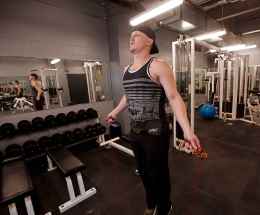First case for Canada’s first FASD court
Read this article for free:
or
Already have an account? Log in here »
To continue reading, please subscribe:
Monthly Digital Subscription
$0 for the first 4 weeks*
- Enjoy unlimited reading on winnipegfreepress.com
- Read the E-Edition, our digital replica newspaper
- Access News Break, our award-winning app
- Play interactive puzzles
*No charge for 4 weeks then price increases to the regular rate of $19.00 plus GST every four weeks. Offer available to new and qualified returning subscribers only. Cancel any time.
Monthly Digital Subscription
$4.75/week*
- Enjoy unlimited reading on winnipegfreepress.com
- Read the E-Edition, our digital replica newspaper
- Access News Break, our award-winning app
- Play interactive puzzles
*Billed as $19 plus GST every four weeks. Cancel any time.
To continue reading, please subscribe:
Add Free Press access to your Brandon Sun subscription for only an additional
$1 for the first 4 weeks*
*Your next subscription payment will increase by $1.00 and you will be charged $16.99 plus GST for four weeks. After four weeks, your payment will increase to $23.99 plus GST every four weeks.
Read unlimited articles for free today:
or
Already have an account? Log in here »
Hey there, time traveller!
This article was published 28/03/2019 (2453 days ago), so information in it may no longer be current.
Something closer to daylight shines down from the courtroom ceiling, as a 20-year-old man takes a seat in the prisoner’s box.
The familiar fluorescent glare of institutional overhead lights is gone. So is the click-clack of the court clerk’s keyboard — it’s been replaced with a sleek and silent model. A sign outside the Winnipeg courtroom, illustrated with a cartoon gavel, cautions spectators not to walk in and out — the swinging of the heavy wooden door would be yet another distraction.
Crown attorney Jodi Koffman greets the young man, using his nickname. They’ve seen each other often over the past eight years.
The man has been in and out of court since he was 12, most recently for a string of breach charges and for methamphetamine-fuelled crime. The drug worsens the effects of his alcohol-related neurodevelopmental disorder, and he’s just spent 13 days in jail for being caught with a knife on a Winnipeg Transit bus.
Over the years, he’s memorized his defence lawyer’s phone number and has undergone every type of court-ordered assessment imaginable.
His is the only name on the docket Thursday at the opening session of Canada’s first court designed for people with fetal alcohol spectrum disorder. The lawyers, and presiding provincial court Judge Mary Kate Harvie, hope it will be different.
‘The idea behind this court is that we not take a business-as-usual approach’
– Provincial court Judge Mary Kate Harvie
“The idea behind this court is that we not take a business-as-usual approach,” Harvie tells the man, talking to him clearly and plainly as she takes a moment to think about his case.
The young man is a fitting example of the need for an FASD court in Winnipeg — one that has been years in the making. It began as an expansion of the province’s FASD Youth Justice Project, which started in 2004 to assess and diagnose young people who had been criminally charged and were suspected of having cognitive challenges because they were exposed to alcohol in the womb.
In an interview, Harvie said the project didn’t involve anyone 18 or older, and this weekly court will. It relies on lawyers to refer clients who have previously been diagnosed with some type of fetal alcohol spectrum disorder.
Collaboration with Winnipeg’s FASD Centre, treatment centre officials, probation officers and correctional officers was key to getting the court up and running, Harvie said.
While there are some mental health courts in Canada that work with people who have FASD, Winnipeg’s court is the first of its kind, Harvie said. It’s particularly important in light of high court rulings that say judges must have clear evidence there is a link between someone’s cognitive disabilities and their crimes before they make that connection.
‘It’s important for us to know what it is that’s contributing to any offender’s behaviour and whether or not there is some deficit which we should be taking into account’
– Provincial court Judge Mary Kate Harvie
“It’s important for us to know what it is that’s contributing to any offender’s behaviour and whether or not there is some deficit which we should be taking into account. Because FASD is often, not always… a hidden disability and is sometimes masked by other behaviour, it’s really critical for us to know whether or not that is a contributing factor to their offending behaviour and whether or not there are supports out there that might assist in ensuring they don’t get into trouble again,” Harvie said.
The court is only for youth and adults who have already been diagnosed — even though an FASD diagnosis can be difficult to establish, especially for adults.
“We want to monitor the demand for the court, first of all. We want to try and monitor whether individuals are being married up with supports they might not otherwise be receiving. We want to try and see if we’re catching people who are falling through the cracks,” Harvie said.
The 20-year-old in court Thursday was one of those people, Koffman and defence lawyer Aaron Braun agreed.
Even though he’s been in the care of Child and Family Services since he was a baby, and was given an extension of care after he became an adult, there was no placement for him when he turned 18. Now, he’s homeless — a fact that gave Harvie pause as she prepared to release him on time served to complete probation.
‘We want to monitor the demand for the court, first of all. We want to try and monitor whether individuals are being married up with supports they might not otherwise be receiving. We want to try and see if we’re catching people who are falling through the cracks’
– Provincial court Judge Mary Kate Harvie
As Harvie talked to his probation officer about his living situation, the 20-year-old interjected.
“Can I say something?” the young man asked in a near-whisper, the hair on the left side of his head spiked up as if he’d slept on it. He stood up and began to explain, almost apologetically, he had stayed in 24-hour shelters and with friends because he had nowhere else to go.
“I don’t want you to think we’re being critical of you,” Harvie said. “I’m just wondering if there’s a way that we can do just a bit more to help you out.”
In the end, Harvie decided to release the man from jail Thursday, and continue his sentencing hearing next week.
“I’m hoping this court will shine a light on where the resources he has can do better, and I’m sure this court will be very helpful for people who don’t even have the resources that he has in place,” said Braun, the man’s defence lawyer.
“I’m also very hopeful for situations like today, where someone may have resources but they haven’t quite been working the way we’d hoped and we can kind of get to the root of the problem and change things.”
katie.may@freepress.mb.ca
Twitter: @thatkatiemay

Katie May is a general-assignment reporter for the Free Press.
Our newsroom depends on a growing audience of readers to power our journalism. If you are not a paid reader, please consider becoming a subscriber.
Our newsroom depends on its audience of readers to power our journalism. Thank you for your support.
History
Updated on Thursday, March 28, 2019 7:33 PM CDT: Adds photo









